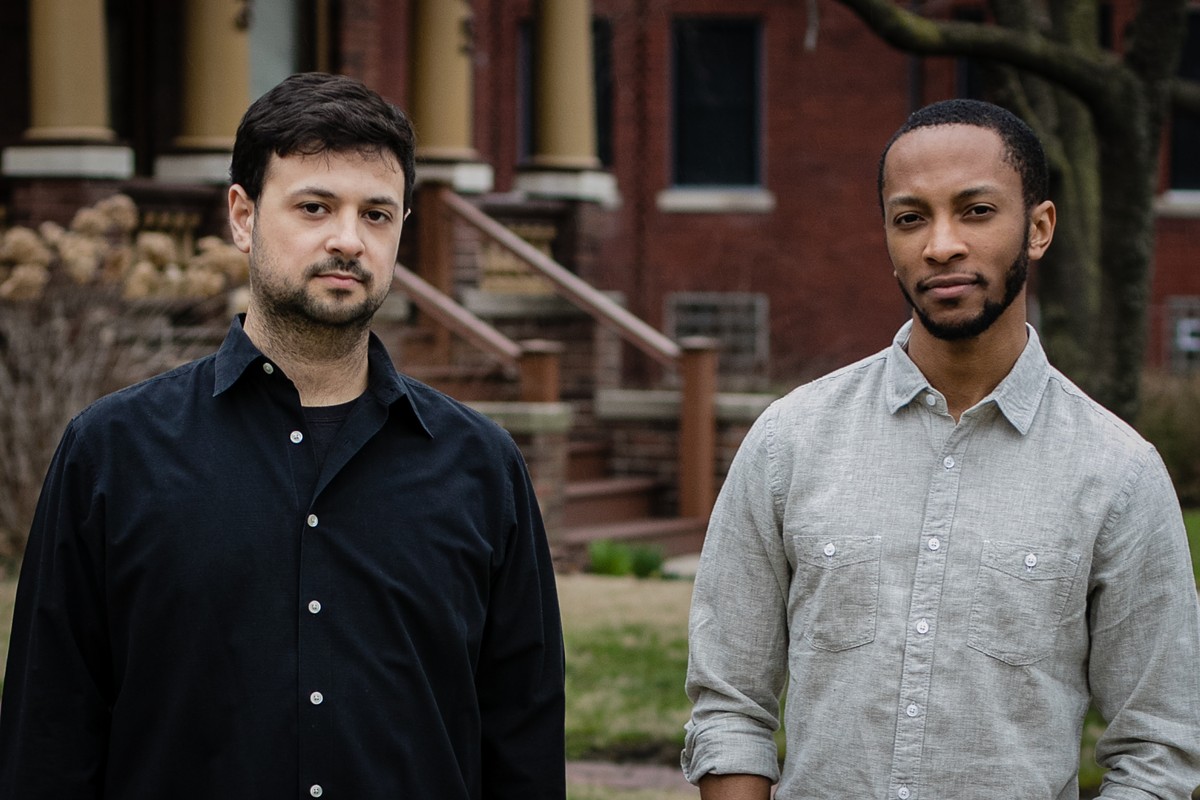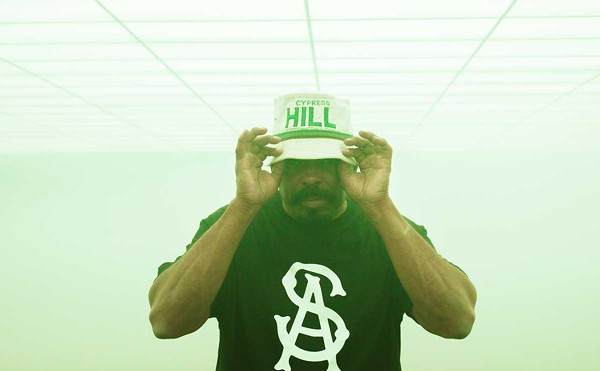For as steeped in jazz the musical history of Detroit is, it turns out the city's musical future might well form in that very same mold, carved out by a crop of young musicians who have deservedly inherited the mantle.
Two of these musicians are saxophonist Marcus Elliot and pianist Michael Malis. They have been performing together in all sorts of settings for many years, but chose to strip things down considerably back in February 2015 when they formed a duo they call Balance.
A slow trajectory with the occasional live gig became a more serious venture this year when they realized this project was something they were both totally, equally invested in. The result is their first recording together, a self-titled album that was released on Polyfold this past August. The seven impressive tracks travel a magnetic path through the possibilities contained within their respective instruments, a careful exploration of both freedom and discipline — which are really one and the same, anyway.
A classical sensibility subtly informs the interplay between Malis' delicate piano and Elliot's lush saxophones; these songs are contemporary jazz of the highest order, a benchmark for where the genre can go and how much is still, and always, imaginable.
You'll recall Elliot from our 2017 "Bands to Watch" profile on him and Sonic Refuge, the excellent EP he released with his quartet earlier this year. Malis is a member of that quartet and an accomplished composer, improviser, and pianist in his own right; his debut album featuring Malis as leader of his own trio (Lifted from the No of All Nothing) came out two years ago.
Both began playing at a young age and have studied under notable figures in the jazz community, including Diego Rivera, Rodney Whitaker, and the late Geri Allen; the album Balance is dedicated to her. Between the two of them, they have shared stages with a diverse group of eminent musicians, including the late Marcus Belgrave, Marion Hayden, Jaribu Shahid, Dennis Coffey, and Talib Kweli — to name just a few.
You can pick up the album online at balance.bandcamp.com and on CD at live performances, of which Balance has several coming up. In advance of their next two shows this weekend — one in Ann Arbor and another in Detroit — we sat down with the pair to discuss their new album, how Balance differs from their other projects, and more.
Metro Times: What does the name Balance mean to you and why did you choose it?
Marcus Elliot: Most of the bands that I have been a part of, people just use their names, and there's nothing wrong with that, but I felt we could be more creative and put a little more thought behind our project. ... I thought of the name Balance because it's something that I know I strive for, and I know it's something that Malis also pursues in his own life. It's something that comes up in our conversations outside of music a lot, so that kind of popped into my head, like yeah, we're about balance.
MT: It's a good name for a duo.
Michael Malis: There's something about just piano and saxophone that feels like a really grounding force. We can strip away everything else and just bring it back to basics. That's what Balance feels like, it feels like standing on our two feet. For years I've been playing in Marcus' quartet as a piano player, and for a long time, every once in awhile, in the middle of a quartet set — this was way before Balance — Marcus and I would sometimes break away and do one selection that was just a duet. Even when we were in high school and college, when we'd play we'd do that sometimes, and to me that always felt like a moment where the set, if it was getting pretty high energy, we could cool it off, or if things were going in one direction, we could bring it back to a level of focus. Balance comes from that as well, as something we've tried to embody subconsciously for a really long time.
MT: What makes Balance different from your other projects?
Malis: One of the biggest differences for me is that a lot of the projects we play in tend to be somewhat hierarchical in that there's a leader, and the leader brings in musicians to help play in that group, [like] Marcus' quartet. He was the leader and we were the band. We would definitely have input and give-and-take, but at the end of the day Marcus is the captain of the ship. It's the same thing with my trio, where I'm the leader and the compositions [are mine]. The band obviously has big input in what's happening, but at the end of the day I'm the director of the film. With Balance, it's absolutely a collaborative effort so we both have to sign off on everything. We really are sculpting as a group, together. We both have an equal stake in it. This is something that's not mine, it's not his. It's ours.
Elliot: It just really feels like we are stripping a lot of things away and are very exposed in so many different ways. Not only is it musically but also physically challenging, at least for me [laughs], to perform in this setting. It demands so much of you because usually as a horn player, if I'm in a group, I can play the melody and then I can go chill out for a second — so [playing as a duo] is just another level of endurance. For Mike as well, there's a certain level of focus that needs to happen for the music to really come out the way that we want it to come out. If we're not all in, it's going to be very obvious.
Malis: It's true. We really have nowhere to hide in this group. It's even harder than playing solo because when you play solo, you can play and know that you can get away with this or that, but when you have someone else there to hold you accountable musically, it has all of the difficulties of playing solo but also all the difficulties of playing in a group. To me it takes the hardest of both formats and puts them together.
MT: Can you both choose a favorite song on the album?
Elliot: My favorite is "Serpent's Serpent," the opening track. I love how we recorded it, but I am really digging how we've been playing it recently live. We've been getting into some really cool spaces with that song.
Malis: My favorite one to play, and we have changed this one a lot too, is "August." I really love the way that the sonorities develop in the very beginning. When we get into that second part, it has some serious momentum behind it. Marcus has a great way of writing these lines that really twist and turn until you don't even realize it but you've been building momentum for minutes now and suddenly you're there and it feels really great to have built it all the way up to this point. "August" is a great example of Marcus' ability to do that, where it almost feels like something you can hum or tap to, but then one beat gets lopped off, or one interval is actually a different interval than [the one you thought it was]. Familiar enough to be identifiable, but unfamiliar enough to always be a surprise.
MT: If you had to describe your relationship to music in one word or phrase, what would it be?
Malis: It's not going to be one word, it's going to be a phrase: cultivating peace. When I think about why I'm a musician or why I compose, I think that whenever I am musical, I feel like the best version of myself, like a version of myself that can hopefully cultivate peace, even if the music has a level of intensity. There are a lot of things that I could have done in my life where I would have been a less peaceful person. Being a musician feels like a good route to peace.
MT: When you mentioned intensity, that made me think of the eye of the storm. That's where the musician is.
Elliot: Yeah, totally. For me, music has always been a practice of reminding me that I'm human. We're the only creatures that do this, that organize sound in this specific way, so it's really one of the most human things we can do. In the world that we live in now, where there are so many things pulling us away from that, it's really important to have practices like music, that remind us [we are human].
Balance has three shows coming up: Kerrytown Concert House on Saturday, Nov. 11; 415 N. Fourth Ave., Ann Arbor; kerrytownconcerthouse.com; Starts at 8 p.m.; $5 for students, $15 general admission, $20-30 for seats. Next is St. Matthew's & St. Joseph's Episcopal Church on Sunday, Nov. 12; 8850 Woodward Ave., Detroit; Starts at 5 p.m.; $10. and then at Community House in Birmingham on Wednesday, Dec. 20; 380 South Bates, Birmingham; Starts at 7:30 p.m.; $25 or $35 with signed CD.






